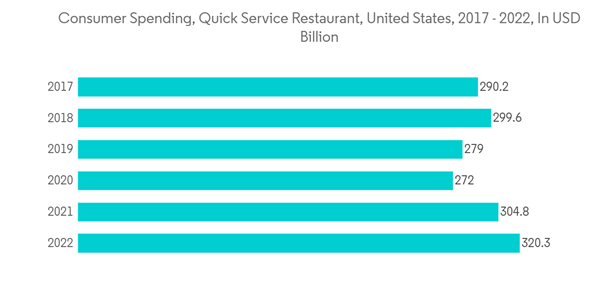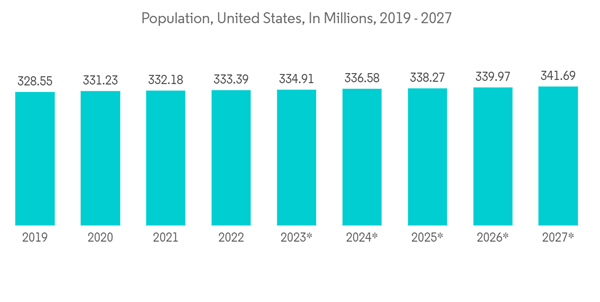Key Highlights
- The demand for single-use packaging that is smaller and convenient to use, as well as the need for a strong visual impact, are expected to lead to an increase in single-use packaging in North America over the forecast period. Single-use packaging refers to products used only once and then discarded or recycled. Single-use packaging includes plastic bags, single-use straws, trays, boxes, plates, coffee stirrers and bottles, soda and water containers, and most food packaging.
- The North American single-use packaging industry is growing steadily, as it has successfully implemented solutions for several packaging innovations it faced. The North American landscape is characterized by the popularity of single-use plastics in the United States and Canada. Owing to the cost-efficiency and variety of single-use plastic usage, these countries have adopted single-use plastics in many end-user industry applications.
- The pharmaceutical sector has been a significant contributor to the growth of the single-use plastic packaging market in the United States. Medical items, such as medical supplies, needles, and pharmaceuticals, are often packaged in plastic packaging because they reduce the risk of contamination, thus safeguarding end-users' interests. Additionally, the single-use beverage packaging market is expected to grow due to the increasing production of different package sizes to accommodate the rising demand for bottled beverages, soft drinks, and alcoholic beverages, as well as ready-to-drink beverages and milk.
- Among the primary drivers for growth in the market are the increasing demand for e-commerce and online sales-driven food delivery services and the utilization of disposable packaging that provides greater convenience and effectiveness. Despite its environmental impact, disposable packaging is still widely used due to its lightweight and resilient properties compared to other materials.
- In the United States, there are currently no regulations restricting single-use plastics on the federal level. However, many states and cities have enacted or are planning to introduce acts to regulate the consumption of single-use plastics, such as shopping and grocery bags, plastic straws, styrofoam utensils, and food and beverage containers.
- Moreover, the post-pandemic trends have increased the use of online food delivery applications, increasing the application of single-use plastic packaging products amid the hygienic concerns regarding reusable packaging, thus positively impacting the market.
- According to the Center for Strategic and International Studies, the Russia-Ukraine Conflict restricted food exports from Ukraine and Russia and increased the prices of these commodities. The rising cost of packaging materials and items has resulted in a decline in profit across the supply chain.
North America Single-use Packaging Market Trends
Growing Number of Quick Service Restaurant across the region
- Quick-service and fast-food restaurants are the key segments of the restaurant industry. Fast food brands, including Subway, McDonald's, Burger King, and KFC, dominate the landscape for restaurant franchises in North America. Moreover, the role of breakfast time in the success of QSRs is becoming increasingly significant. The consumption of breakfast away from home is becoming increasingly popular, and QSRs are capitalizing on this trend to become an essential player in the restaurant sector.
- Further, service restaurants are an essential segment of the United States food services industry with a phenomenal impact on the United States economy as consumer spending has also increased year on year as per the data of dominos Pizza consumer spending in the quick service restaurant (QSR) sector in the United States from 2017 to 2022 has reached to USD 320.3 billion from USD 290.2 billion except the decline during the COVID-19 impacted period. The over-growing concept of QSR in the United States and Canada will drive the demand for single-use packaging in the forecasted period.
- The use of single-use packaging in Quick Restaurant Services (QSRs) has become a critical component of the rapidly changing lifestyle of the region. As the amount of time spent preparing meals at home decreases, more and more people are turning to fast food for sustenance. By utilizing single-use packaging, food service establishments can package meals economically, securely, and efficiently while providing customers with a mode of convenient and effective transport. The single-use packaging of food serves as a means of packaging meals rationally, securely, and economically while providing customers with a timely and effective way to transport their meals.
- As consumer preferences for delivery and online ordering have grown, many restaurants have outsourced these functions to third-party technology companies or delivery platforms to avoid the high costs associated with setting up and managing their systems. Additionally, many restaurants have begun to adapt their operations to accommodate the ever-evolving customer mix, including implementing "to go" counters, dedicated parking for curb pickup, and separate queues for online delivery orders.
- Further, the franchise model has emerged as a new trend in the growth of Quick Service Restaurants (QSR) chains, potentially aiding in the expansion of the market. Government initiatives, such as incentives for franchisees and franchisors, have been instrumental in attracting international brands and investors to enter the market with the assistance of experienced local operators.
- In addition, the demand for food packaging has been impacted by the utilization of large-scale data, which has significantly impacted the development of the online food delivery sector. Restaurants constantly monitor and adapt to their customers' changing and dietary preferences to improve their services. For instance, the food ordering platform GrubHub conducted a study to determine the priorities of both men and women when ordering meals. The results showed that both genders preferred pizza the most. GrubHub then utilized this data to create a personalized experience for its customers. Other online delivery platforms and food companies utilizing their online platforms also use big data to improve their offerings.
United States Expected to Hold Significant Share in the Market
- The United States is the world's most prominent trading nation, second only to China, and one of the most populous countries in the world. Its economy is primarily driven by its abundant natural resources and sophisticated infrastructure, as well as its population and workforce, which enable it to produce goods and services at a high level of productivity. Furthermore, the United States is home to one of the world's most significant financial markets, with most countries having established commercial relationships with American companies.
- Moreover, as per the data of the International Monetary Fund, the total population of the United States was 333.39 million in 2022 and is forecasted to reach 341.69 million by 2027. This growing population and dynamic lifestyles and the consequent dependence of consumers on processed, packaged, and pre-cooked food are also augmenting the sales of Single-use bottles and containers. This trend bolsters the sales of single-use products, owing to their superior barrier properties, convenient format, high-quality printability, and prudent usage of material resources.
- North America is a significant region when it comes to plastic packaging. Every year, Americans use more than one hundred billion plastic bags, resulting in an average consumption rate of 109 kg per person. As a result, the United States is expected to remain the leading market for plastic packaging over the next few years. The United States is also home to the FDA, which has a strict approval process for all food contact packaging materials, including those used with food.
- The United States is one of the largest consumer countries of coffee. According to the National Coffee Association, per capita coffee consumption in the United States is around two cups daily, indicating nearly 120 billion disposable cups are used yearly. According to Thomasnet, an online platform for supplier discovery and product sourcing in North America, 54 billion cups are made of paper, 38 billion are plastic, and 26 billion are made from foam. However, these paper cups are usually lined with a polyethylene plastic coating, due to which recycling them through a standard process becomes complex.
- Owing to the sustainability concerns caused by inefficient recycling processes, some end-users are shifting to more sustainable ways instead of paper cups. For instance, in March 2022, Starbucks, one of the largest coffee retailers, announced its plans to phase out its iconic paper cups and replace them with reusable options by 2025, which is part of Starbucks' waste reduction strategy.
North America Single-use Packaging Industry Overview
The North American Single-use Packaging market is primarily fragmented, comprising several global and regional players like Novolex, Pactiv LLC, and Dart Container Corporation. Winpak Ltd., Berry Global Inc., and more are vying for attention in a contested market space. This market is characterized by low product differentiation, growing levels of product penetration, and high levels of competition.In June 2023, Novolex-owned Hilex unveiled new variants of its flagship ProWAVE tote bag, a reusable, recyclable tote bag designed to simplify the delivery and pick-up process for supermarket, restaurant, and retail chains and their customers.ProWAVE Totes are available with 2.25 millimeters (mm) gauge film. They are made with at least 40% recycled post-consumer material, which enables them to comply with the majority of legislative mandates for reusable bags in the United States, including those applicable in California. Customers can also choose from a ProWAVE Tote made of 1.7 millimeters (mm).
In February 2023, Berry Global Healthcare is offering comprehensive packaging to assist customers in capitalizing on the growing demand for Child-Resistant (CRC) Packaging and Tamper-Evident (TE) Packaging for the Pharmaceutical and Herbal Market for Syrup and Liquid Medicinal Products. The new Berry Healthcare bundle consists of seven different ranges of 28mm Neck PET Bottles in sizes ranging from 20ml to 1000ml, with a range of designs and eight accompanying closures that feature tamper-proof and child-resistant properties.
Additional Benefits:
- The market estimate (ME) sheet in Excel format
- 3 months of analyst support
This product will be delivered within 2 business days.










